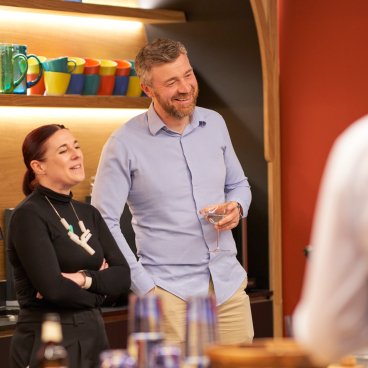Material Source Studio Presents: Manchester Property Outlook – what’s driving the growth?
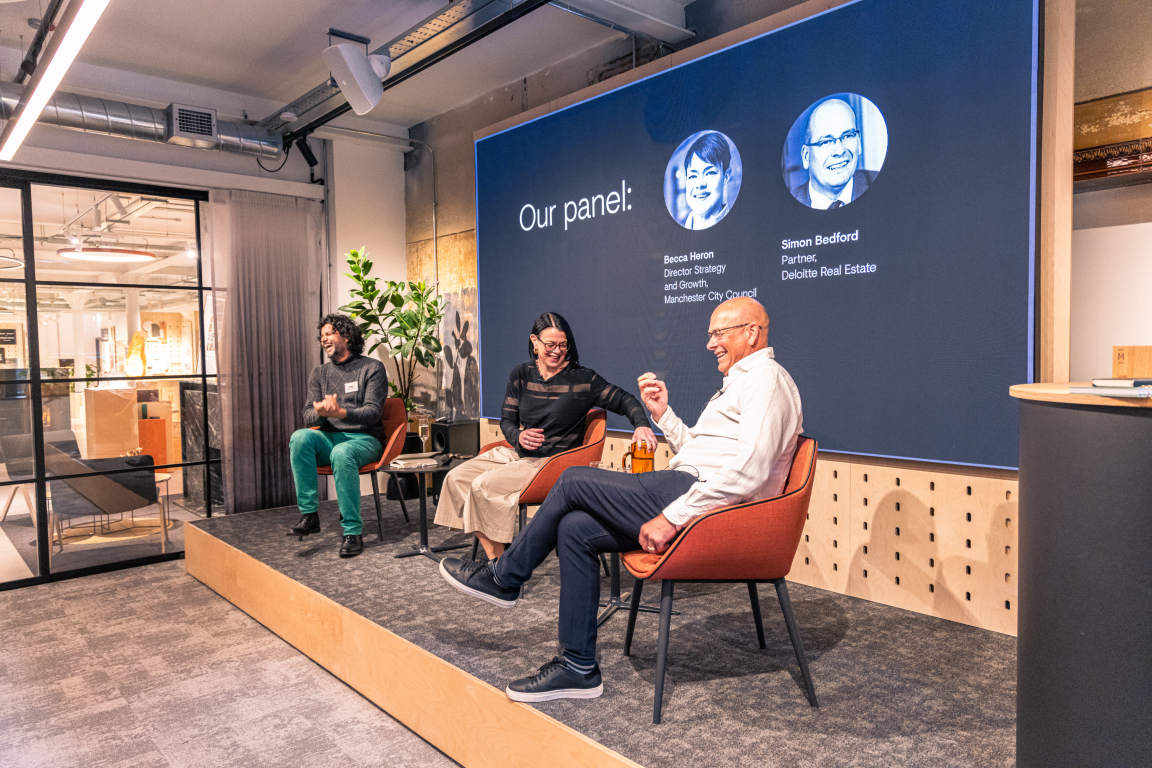
Credit: Tim Ainsworth
It was standing room only at our recent seminar, where the conversation continued down from our Glasgow Studio to consider Manchester's property outlook.
While the cities of Manchester and Glasgow are in two very different phases – on the face of it, very stark in contrast - neither is operating without its challenges.
Putting the spotlight on the north west, two stellar panellists Becca Heron, director of strategy and growth, Manchester City Council, and Simon Bedford, partner, Deloitte, shared their insights into the phenomenal growth of Manchester to-date, plus unveiled plans for the near future, in conversation with host, David Smalley, and featuring questions from an esteemed audience of sector professionals.
With a thriving city centre residential population, demand and investment showing no signs of slowing, and plans to expand outwards beyond Victoria Station into the north, Manchester "caught a wave" as Simon put it, and continues to roll with it, facilitating development and favouring imagination.
Though not without its "growing pains", there's no doubt after hearing the evening's discussion that Manchester's star is still on the rise, and it's now about the city's next phase in "densifying in the right way". Once again, the extended hour and a half session still only allowed the surface to be scratched - here we provide a snapshot of what was said.
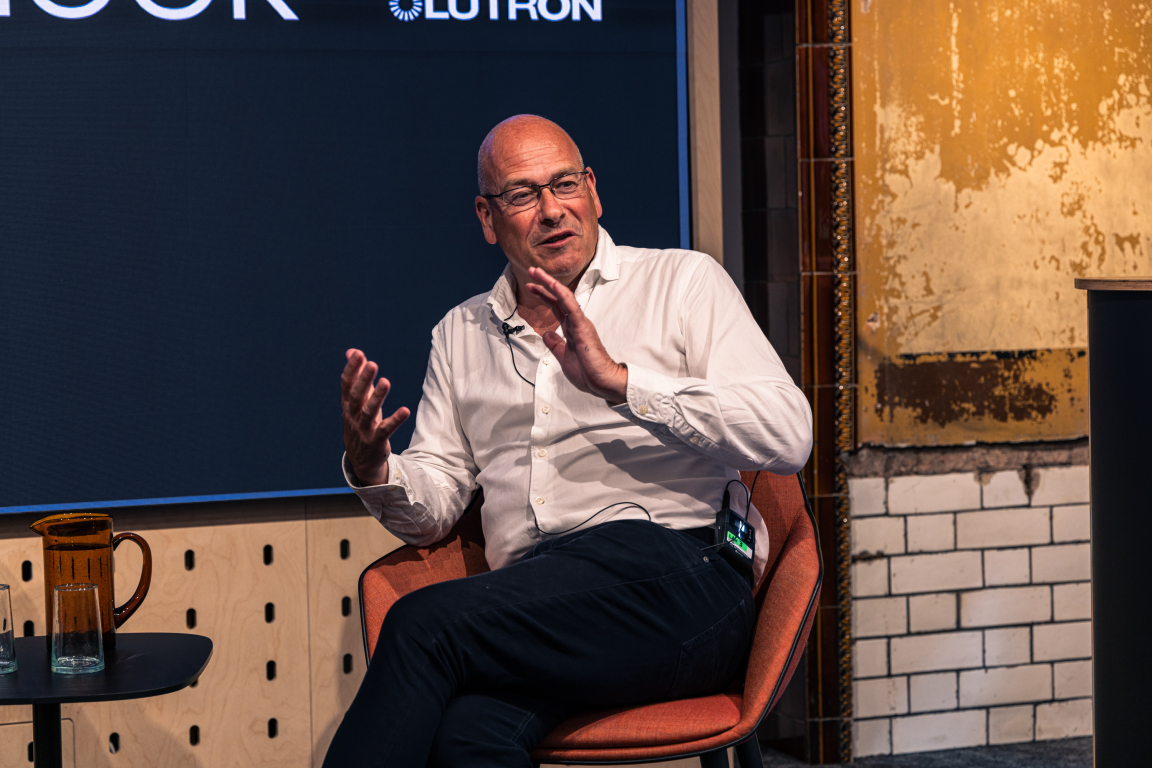
Credit: Tim Ainsworth
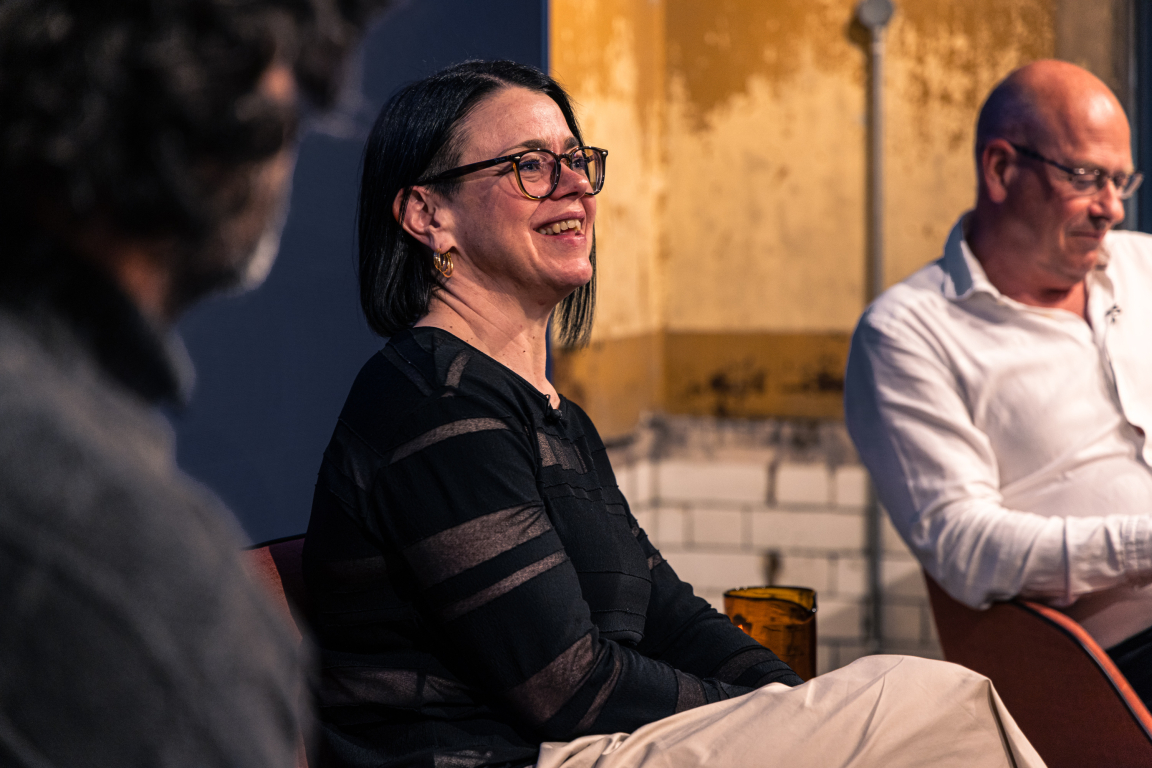
Credit: Tim Ainsworth
Stratospheric growth
Whether a resident of Manchester or not, there’s no denying that in terms of thriving UK cities, it's up there with the best of them. But how aligned is the local property market to the desired growth of the “Northern Powerhouse”? David opened with the question, “What’s so positive about Manchester’s property outlook?”
“For me, it’s recognising that the property sector is facing some real challenges”, began Becca, acknowledging that though Manchester’s growth is evident, and perhaps envied by some, it’s not immune from the difficulties being felt on a national-scale - “construction, inflation, access to finance, labour shortages” to name but a few. However, what the city does have, where others may not, is optimism, “Manchester’s outlook remains so strong”, suggests Becca, even in times of adversity.
Reminiscing on her foray into Manchester City Council in 2002, Becca comments that in the city centre there has been a drastic change in behaviour - “There was no demand for housing – there were empty streets – the city was really struggling to adjust to the decline of manufacturing, and when you see how much it’s changed – in development and regeneration terms, 20-30 years is a short time. The transformation has been incredible."
Becca also highlighted the diversity in economic growth – “high value sectors such as creative and digital, for example, health innovation, advanced manufacturing and materials, financial and professional services – the city is just going from strength-to-strength.” Despite the challenges mentioned at the top of Becca’s answer, she believes Manchester is “boring up better than comparison cities”.
Returning to the reminiscent view of Manchester 20-years ago, David asked Simon what he remembers from that time. “In 2002, we had the Commonwealth Games”, he replied, adding, “it was transformational for the city”. According to Simon, the hosting duties, said to have cost around £300million, secured two crucial things: “It brought international sport to Manchester, probably, for the first time. And it allowed parts of the city, that no one had ever seen, to be opened up – East Manchester being one with its post-Industrial landscape transformed through the Commonwealth Games.
“This was an incredibly important staging post for the city”, he added, “it put us in an international space, while illustrating how the culture of sport can drive change.”
“When you look back, in recent times, was this the most significant thing to happen to Manchester, then?” asked David.
“Though I hadn’t thought about it in those terms, potentially, yes”, said Simon. “We always look at things with a backwards lens, don’t we? People talk about the IRA bomb in 1996 as a transformational moment for the city, but actually, that only concentrated effort on the core of the city centre, whereas with the Commonwealth Games, it gave the confidence that some of these baron, deprived landscapes could be tackled. This experience has been taken on and is being applied in Salford.” Often regarded as the catalytic project that opened up Salford was the regeneration of the Quays area – something Simon was involved in as part of his first job as a Town Planner at Salford City Council.
Becca also agrees that the Commonwealth Games was the turning point for Manchester, though through the city’s response to the IRA bomb, she believes it “showed it could deliver – and this will have underpinned the success of the bid”, “but it put East Manchester on the map, it secured a fantastic stadium, and when you look at the investment that’s gone in around there – the training ground, the velodrome, the tennis centre, the new Co-op Live arena – that area is still developing.”
Co-op Live opened its doors in May, following a period of postponements, but has since been met with much positive press and accolade from the performers it’s hosted. Becca believes developments such as this show off Manchester’s intentions – “We’ve actually got two of the largest stadiums in the UK – the AO was the largest previously at 23,000, and Co-op Live is 23,500, but the way it’s designed is specifically for music events and it’ll continue to attract those global artists.”
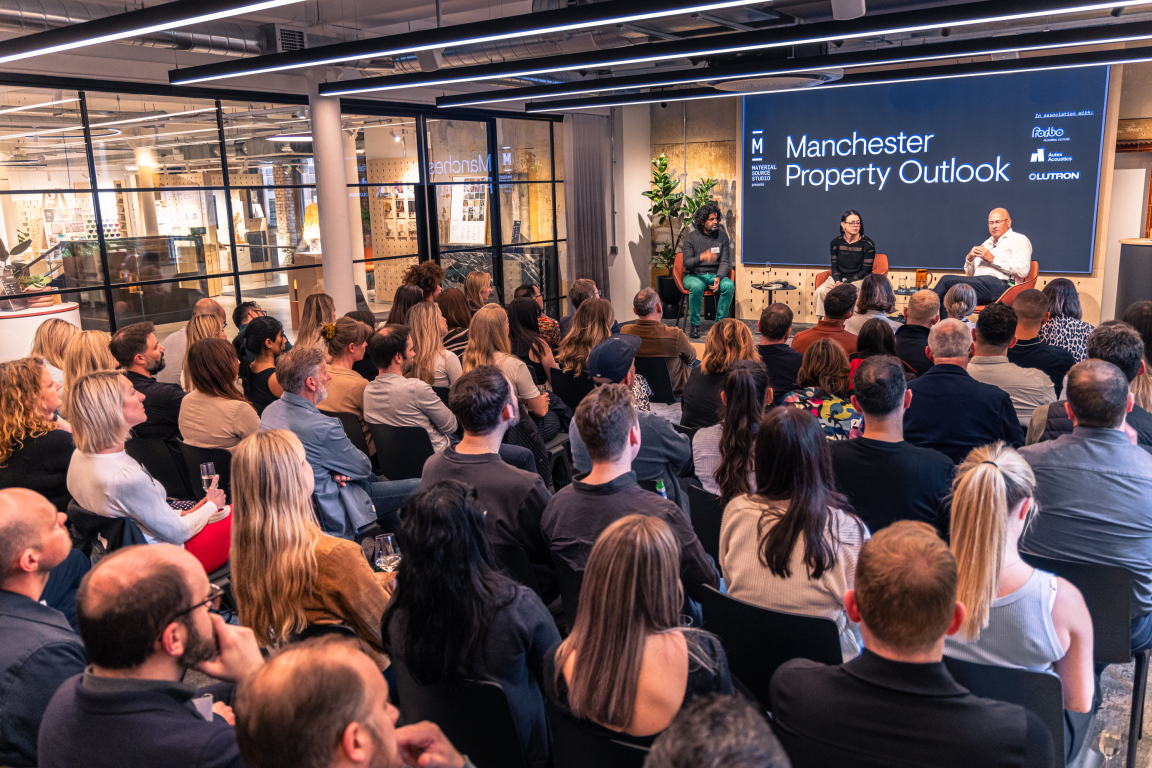
Credit: Tim Ainsworth
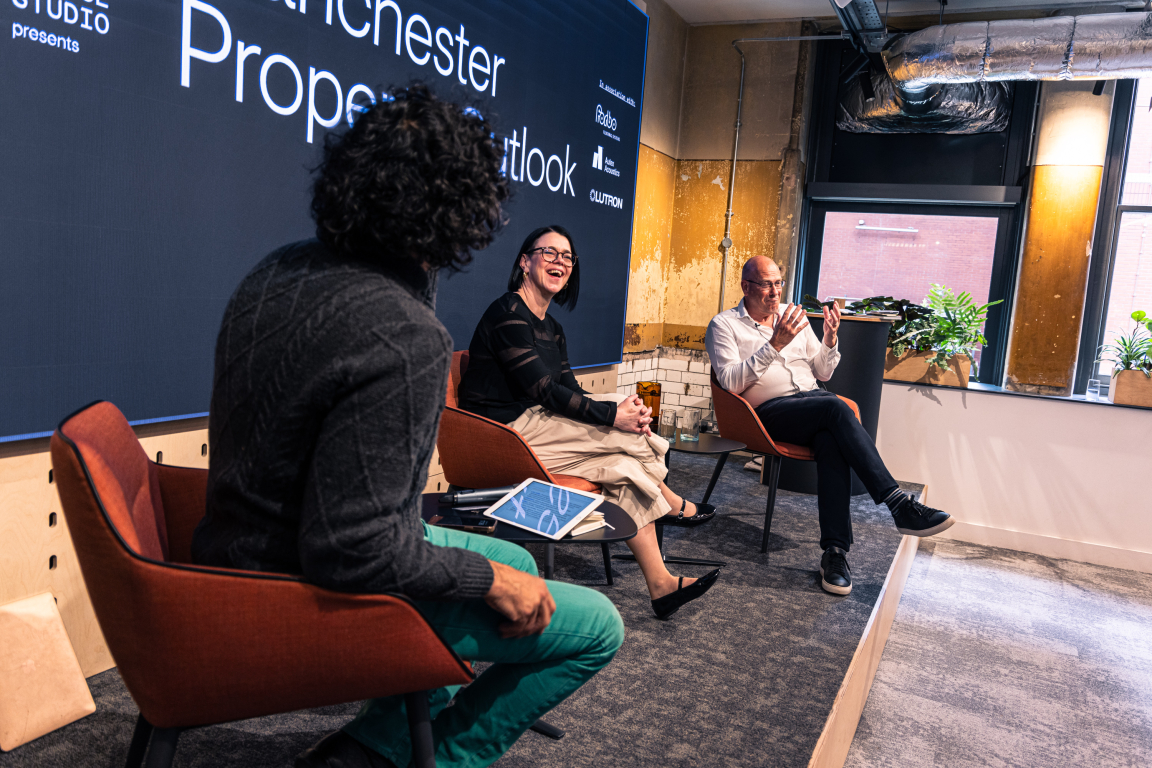
Credit: Tim Ainsworth
The property pipeline
Continuing on the theme of Manchester’s “top stories” when it comes to development – many of which the audience members are involved with from an architecture and design standpoint – David asked the panel to provide a snapshot of what’s particularly key in the property pipeline.
“Manchester city centre will never be ‘done’”, answered Becca, “but as I said at MIPIM, it feels as though it’s at a bit of a tipping point – we’re moving into the next stage – we’ve got a critical mass, and the demand is there.
There’s always been excitement about the city, I’ve felt, but that’s growing. We now really need to look at how we push the benefits of growth out across the city - Becca Heron, Manchester City Council
The neighbourhoods Becca highlighted were NOMA, Mayfield, and Central Retail Park – still being developed, plus Victoria North – the importance of which Becca has championed since starting in her role at the council. “The north of the city has not seen the same level of investment and I think, 15,000 new homes – the social infrastructure that can support is really important.”
Victoria North extends beyond Victoria Station to Harpurhey and Miles Platting. As well as the 15,000 new houses, there will be a Metrolink stop, healthcare and educational facilities, and a city river park delivered as part of the regenerative project. Wythenshawe is next on the list, with the council undergoing a ‘competitive dialogue process’ to onboard a private partner. As well as a duo of areas – “not without their challenges” – that Becca is particularly excited about. “One is Holt Town – the area between Ancoats and New Islington – and the Sportcity Campus. It’s becoming increasingly important to see a plan for that area as we build on the success of Ancoats, New Islington, and the stadium, it’s almost like the ‘missing middle’. We’ve got a growing city centre population, and we need to look at diversifying the offer for people that want to remain central but maybe not in the city centre core.”
With that in mind, the council is looking at different types of property and price-points to go here. Plus the possibilities of making it a car-free zone thanks to its existing transport connectivity. “We need to be seeking how technology and AI could assist us.” Though regeneration is on the cards, Becca makes the point this isn’t about gentrification or displacement, rather “it’s one of the few areas of the city that’s been relatively untouched.”
Perhaps the most challenging of all the council’s proposed projects is the much-anticipated redevelopment of Strangeways and the surrounding Cambridge area – something Becca believes will far extend her career. “It’s really challenging because we don’t have the same level of land ownership, there’s obviously an old Victorian prison, there’s criminality and anti-social behaviour, but we have had to step in there and come up with a plan – not least because GMP are working in partnership with the council and others on Operation Vulcan, through which they’ve made incredible progress – moving a lot of the counterfeiting out.”
Becca made the point that while the improvement in this area is vast, the existing textiles businesses need to know there’s a plan in place so there’s no vacuum for any other type of criminal behaviour to creep back in. “It’s how we protect and build on those, while diversifying, modernising, and making the offer more sustainable.”
Connecting communities
Audience member Atul Bansal, founder & co-owner at Sheila Bird, whose office is based in Cheetham Hill, North Manchester, wanted to congratulate the council on its approach to community consultation tied into the regeneration groundwork Becca discussed, “We have an office in the Cheetham Hill area, and the attitude and amount of effort that the council has put into listening to what the community has to say there – going out of their way – I’ve never experienced before. Is that an instruction that you’ve given people?” he asked Becca.
“Firstly, thank you for saying that. It is. It’s an important area to the city with so much history and heritage, though it’s had significant problems for some time. Part of the reason engagement there is so important is that you don’t throw the baby out with the bathwater, you need to build on what’s already there. Something Manchester’s done well with but we need to keep doing even better is each area has a unique characteristic, and they need to be built on and not washed away. The risk with something like Operation Vulcan, is that it could have been lost.”
“We’re doing similar consultation in Collyhurst”, she added, “the people there were let down by a failed PFI, so we’ve got to be really careful with those communities.”
This approach is said by Becca to be driven by Bev Craig, leader of Manchester City Council, who Simon described as having “inclusivity in her DNA – embracing diversity in the way Manchester needs to evolve.”
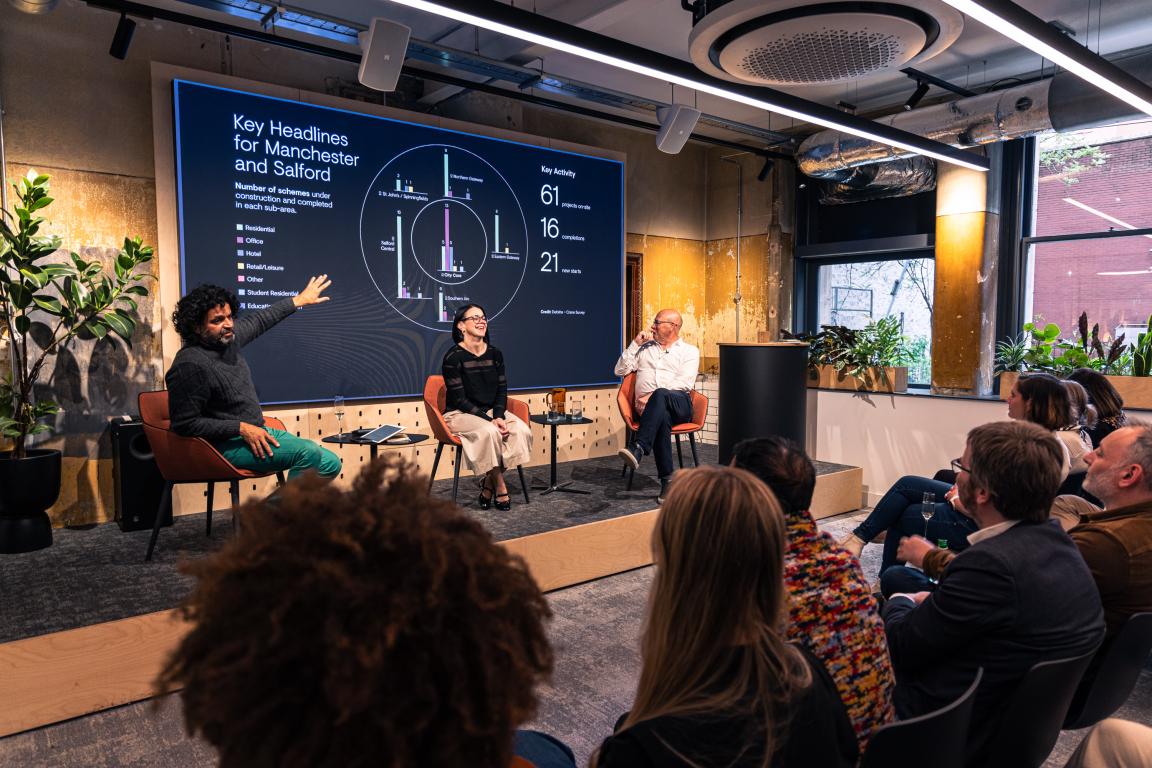
Credit: Tim Ainsworth
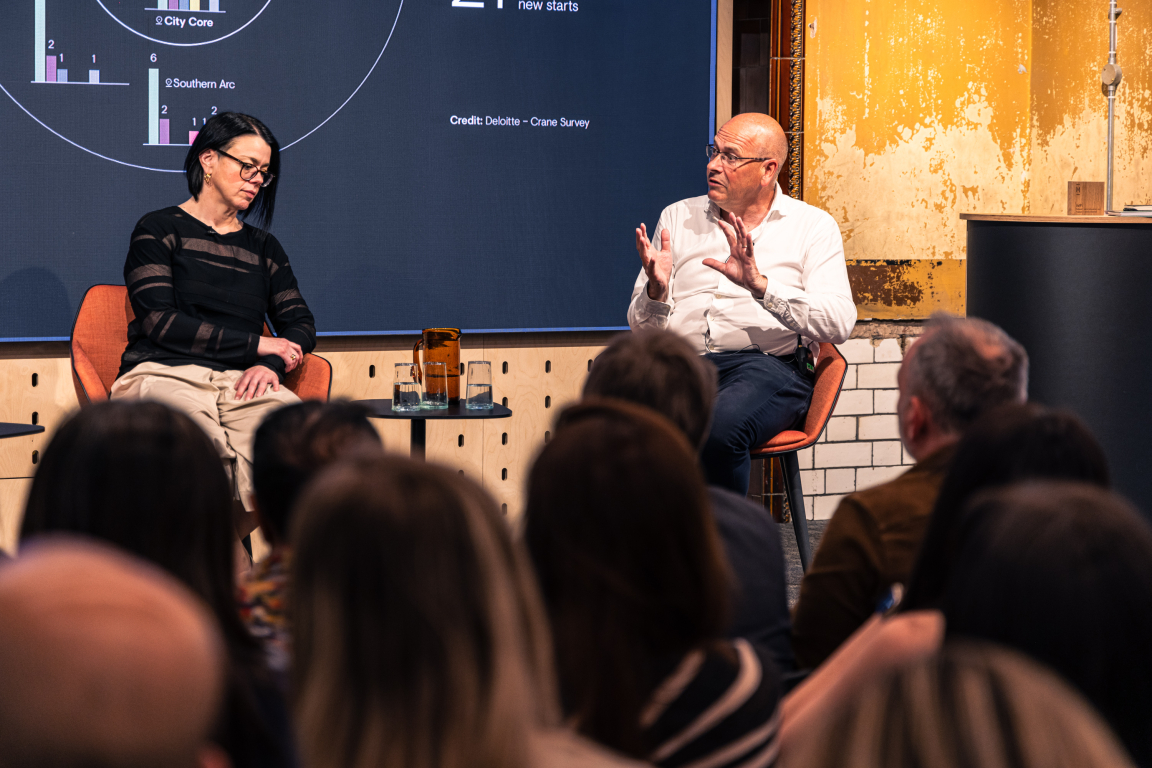
Credit: Tim Ainsworth
Providing a visual reference to the volume of developments currently underway in Manchester, an excerpt from Deloitte’s Crane Survey prompted Simon to comment, “Across the whole city you can see expansion. Victoria North is a story not as well told as it could or will be – it’s transformational.”
“Why?”, asked David. “Because if you think that 10-15-years ago the city stopped, largely, at Victoria Station, it looked difficult compared to the south and west", answered Simon. "It’s significant because it opens up communities in Harpurhey, Moston, and beyond, that have not ‘felt the love’ of what’s happening in the regional centre.
One of the big issues for Manchester – as well as any other city – is the wealth generated in the core isn’t distributed to the people who live just beyond the core - Simon Bedford, Deloitte
“There’s lots of residential on that graph”, said David. “Yes”, continued Simon, “most other cities would bite Manchester’s arms off to have the same level of residential growth.” Though he followed up with the fact they might not admit that – that there is perhaps some envy.
“Why then has Manchester been so successful?” David asked, “Particularly with BTR?”
“It caught a wave”, replied Simon, “but it’s also had an entrepreneurial approach to planning. It uses regeneration frameworks, simplified tools – not overly elaborate statutory planning documents – and this has been around for 30-years. Castlefield was the start of that and we moved on from there.
Manchester is a city that's largely favourable to the construction sector – it likes property development, it doesn’t sneer at it - Simon Bedford, Deloitte
Focusing in on planning, David asked, “You’re indicating that Manchester’s up there in terms of its position on planning – is that correct?”
“It could have gone different ways. This is a combination of people at the council, and also the wider design and real estate community, who work together. That’s another feature of this city. Generally speaking, people are consensual rather than adversarial.”
Becca agreed, adding, “I think there was an early recognition, adapting to the decline of manufacturing that something must go in its place. So when Simon says the city welcomes development, I think it saw 20-30-years ago that unless it adapted it would die.”
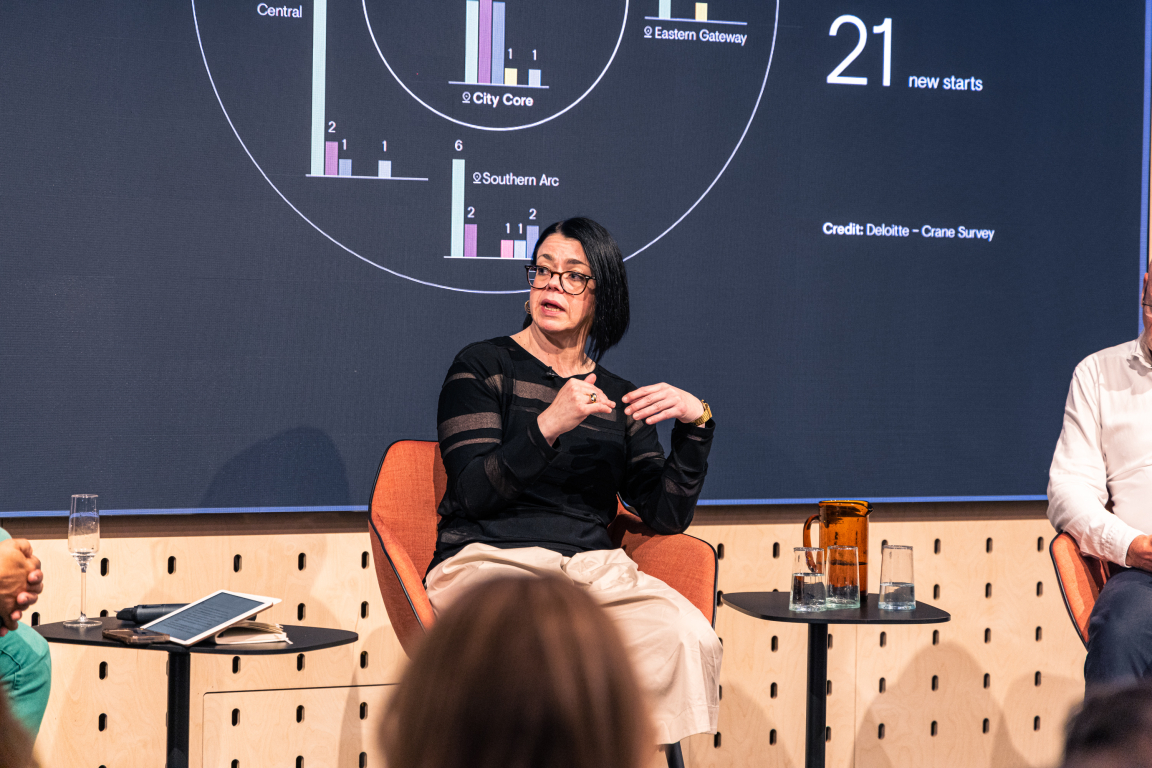
Credit: Tim Ainsworth
A supportive sector
This led to the consideration of the sectors for growth and the conditions needed to facilitate this, as well as partnerships, which Becca describes as “fundamental”, as well as the universities’ talent pool – “I think what we have is really strong city leadership – from 20-30-years’ back – that understood what there needed to be to make it work. Then they plugged away at it and held that steady vision.
This isn’t planning for planning’s sake – it’s what does it contribute to the city? - Becca Heron, Manchester City Council
“If you bring a planning proposal that’s in line with the regeneration framework, the team will work with you to try and make it happen.”
Addressing the debate around the council’s ‘favoured practices’, David asked, “What would you say to the people not so well known to get recommended?”
Simon responded, “There might have been a view a few years’ ago that there was an ‘inner circle’ in Manchester – I don’t think that’s the case now, there’s too much to go at. And there are too many people.”
“Is it important to you and your colleagues at the council?” David asked Becca.
“Yes - Manchester also expects people to deliver”, she replied.
Briefly touching on the property mix in Manchester, Becca indicated there were some exciting developments coming by way of culture – clearly a growing sector. In addition to the residential growth of the city centre, there’s evidently been a shift in the way people are interacting with the amenity offering – David shared statistics highlighting that in 2012, retail made up 95% and hospitality 5%, whereas now, retail sits at 70% and hospitality at 30%.
On the topic of sectors, audience member Sian Atherton, associate, ADP Architecture, asked, “We have a lot of BTR schemes in Manchester – I know when I was working on them in the past, Dave Roscoe asked for evidence of how they could be adapted in terms of a business model for the future, and also structurally. The demand for BTR is going to change – we’re seeing a drop in students and the universities are a huge pull for people staying as young professionals. Change will happen regardless of the government, so my question is what will happen to these BTR structures?”
Simon answered, “Great question, but I’d unpack it more. Of the city centre population, and those coming, we need to ask: who are they? A lot are students, and a lot are young working people, but I think it will evolve – there needs to be room for people who haven’t been able to live in the city centre to do so. I will be thinking hard in the next wave of activity, the new residential markets we need to be more thoughtful about.
“Whether student numbers are dropping or not, they live everywhere – they are hugely important to the city centre but it’s a complex market.”
The new residential markets we need to be more thoughtful about - Simon Bedford, Deloitte
At the council, Becca said they’ve been “under pressure” to make sure there’s adequate provision of student accommodation, reflecting that the student population is still abundant. Though she agreed with Simon that it’s looking at catering to different segments of the market. Holt Town will attempt to support this, through offering options for residents as they “move through life”.
“If you have kids and you want a garden, what are your options for that?” added Becca. “We’ve got to look at how we cater to this growing demand.”
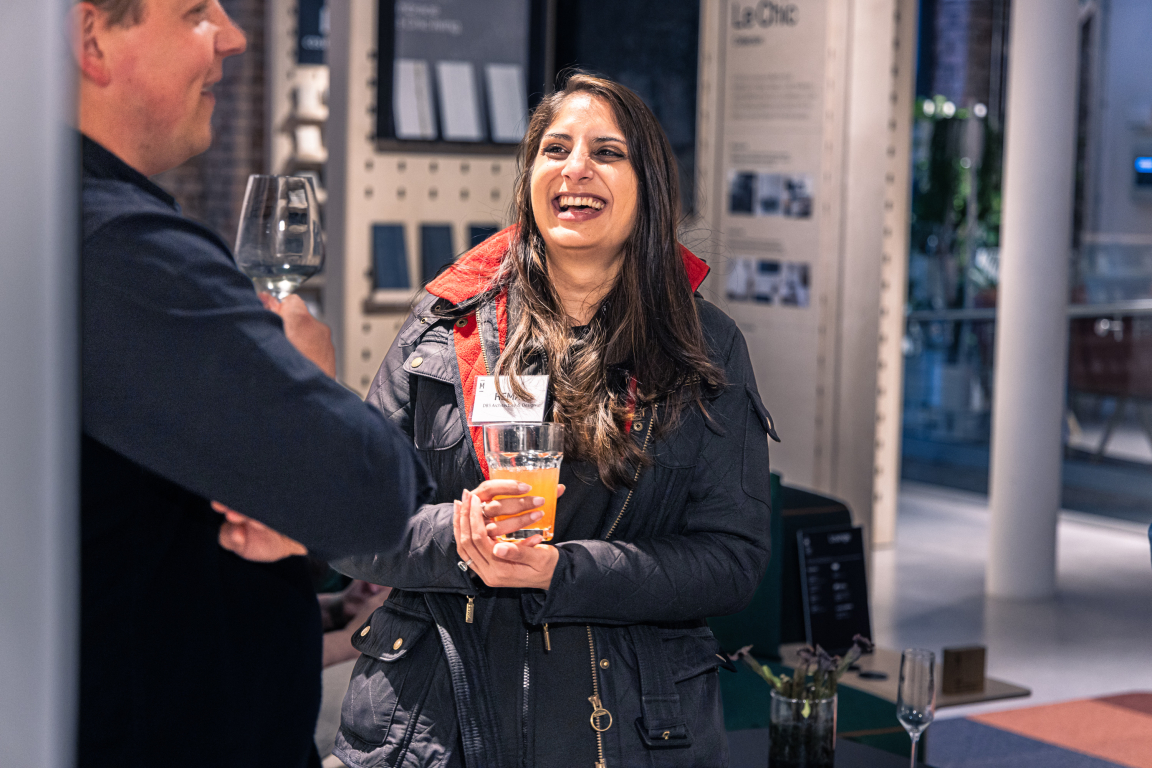
Credit: Tim Ainsworth

Credit: Tim Ainsworth
Growing pains
Here, Simon brought up Manchester’s “growing pains”, which he feels are “brilliant”. “Why?” queried David. “It only has these because it’s been so successful. This is a healthy thing. It’s not a sign of decline.”
Mirroring the Glasgow Property Outlook seminar, the subject of older, established cities was brought up – this time Munich. Simon feels that Manchester is on an earlier leg of its journey, and it needs time to build out all its asset classes.
“What did Munich do for people not to be priced out?” asked Irina Munteanu, architect, DAY Architectural, in relation to businesses being ‘priced out’ of Ancoats.
“There was no market in Ancoats and New Islington 10-years’ ago”, answered Becca. “The transformation started in 2014, and the pace of that I think it remarkable. There is an element of ‘growing pains’ – it’s incredibly popular so it’s pushing values up. It’s not finished yet, phase three is underway with development along Jersey Street in particular.
“We’re seeing such fast growth it’s sometimes difficult to put in the social infrastructure and that’s in part about planning and funding. Schools need demand, as does health. In Victoria North and Holt Town these things will be brought in. I’m not saying we’ve got it entirely right, but I am saying it’s easy to look back in hindsight and forget what the area was like 10-years’ ago.”
Adding to this, in reference to the north’s tendency for modesty and being “a bit picky”, Simon said, “Ancoats is brilliant – why wouldn’t we say to ourselves, well done?”
A question from audience member, Dafini Karagyozova, architects, OMI Architects, suggested the chicken and egg situation that surrounds school provision versus families choosing to settle in the city – “how will the council address this?” she asked.
“It’s challenging”, admitted Becca, “but we do need that provision.”
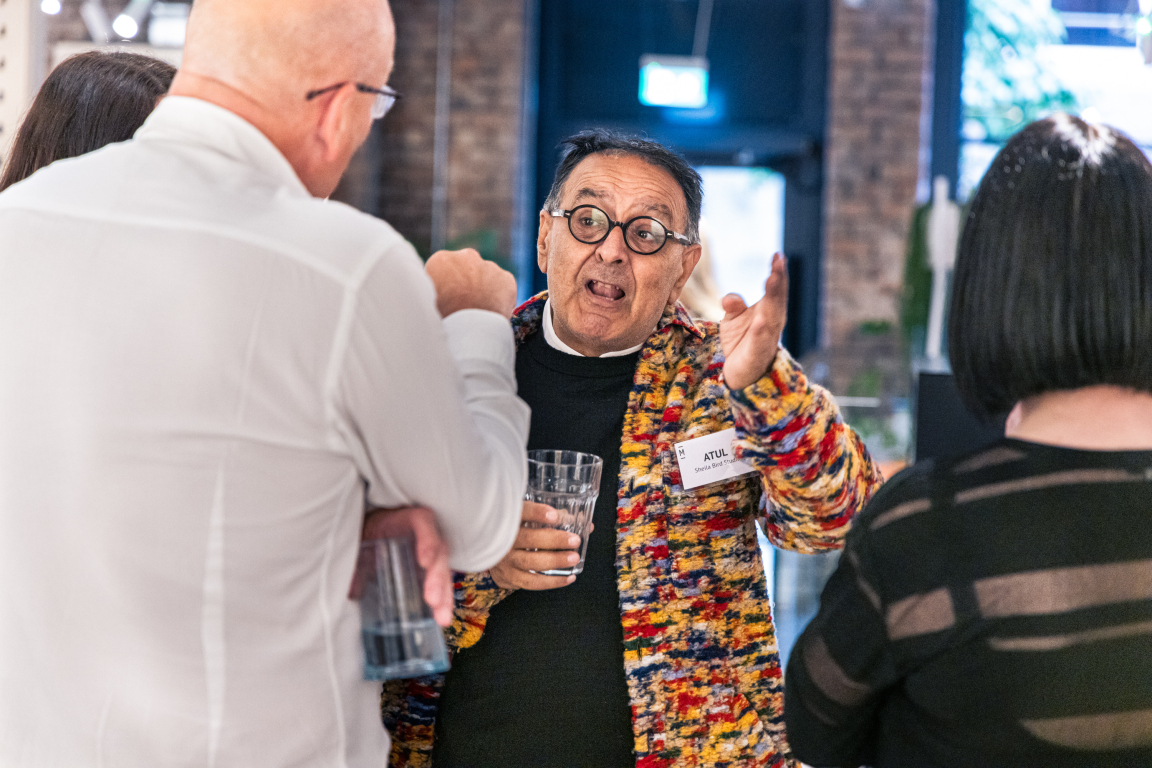
Credit: Tim Ainsworth
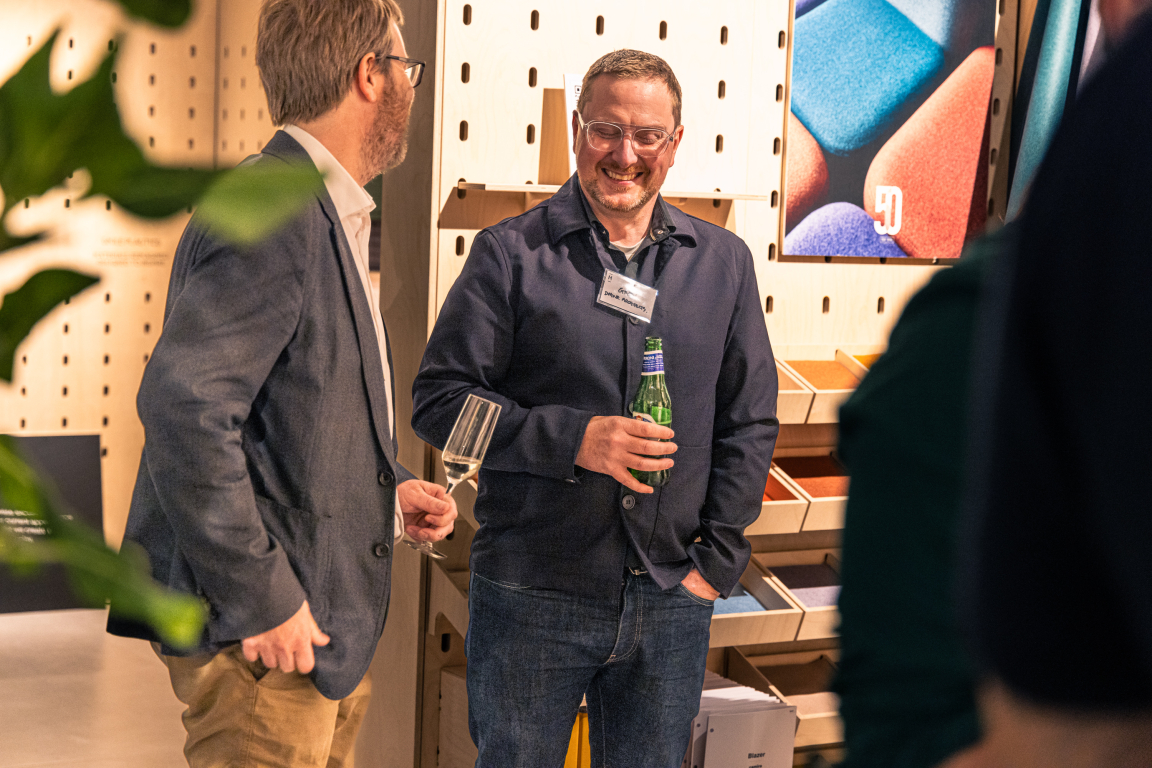
Credit: Tim Ainsworth
Robert Hopkins, director & head of sustainability, AHR Architects, brought up sustainability. “It’s great Manchester has declared a climate emergency – it’s said it will be a net zero carbon city by 2038. How will the city and the property market evolve to deliver our legal requirements to be net zero carbon, and are we looking at models like LL97 in New York as a way of forcing this to happen?”
Worryingly, Becca responded that, “To hit our target for 2025, we need to retrofit 84,000 properties – and they’re not all our properties, so we need other people to do it too. Until people are forced to act, or until it becomes uneconomic to do so, there will be challenges. We haven’t got the answer. And without a national framework or route map there is a limit to what Manchester as one city can do.”
Simon added that his belief is “climate change should be made into an economic set of activities, not something to beat people with. Neither the government or private sector has invested in the tools to create economic activity that realises the gains we want to bring. We won’t get there with the recipe we’ve got now.”
Transport infrastructure was also highlighted as an area where Manchester can make improvements, alongside an audience suggestion that green space could also be better considered. Though Becca brought up Mayfield – “the first urban public park built in a long time”, and the contentious Central Retail Park. “Phase one is moving forward and it will create 7,000 new jobs – jobs will drive the city centre economy, but there is a recognition that we need quality spaces so there will be accessible green space there.”
Bringing the conversation back around to the residential mix, audience member Amy Ackerley, senior interior designer, BDP, asked whether “there’s an appetite amongst the older generations – retirees, downsizers – to move into the city centre?”
Becca thinks there is, and that they’re already here, though it’s not completely accessible currently. “It’s about getting the right offer for the next generation of city centre occupants. We’re not there yet on some of this. There are multigenerational concepts that need to be tested. But at the heart of it is supply and demand.”

Credit: Tim Ainsworth

Credit: Tim Ainsworth
As David commented, the conversation doesn’t stop here but the seminar did. Our many thanks go to our panellists, Becca and Simon, to our audience, and to our supporters for the evening, Autex, Forbo & Lutron – all partners at Material Source Studio Manchester.
If you haven’t already done so, you can read the post-event articles on our Glasgow Property Outlook seminar here, and the roundtable on Glasgow’s Residential Mix here. Next up is our roundtable on The Residential Mix in Manchester.







